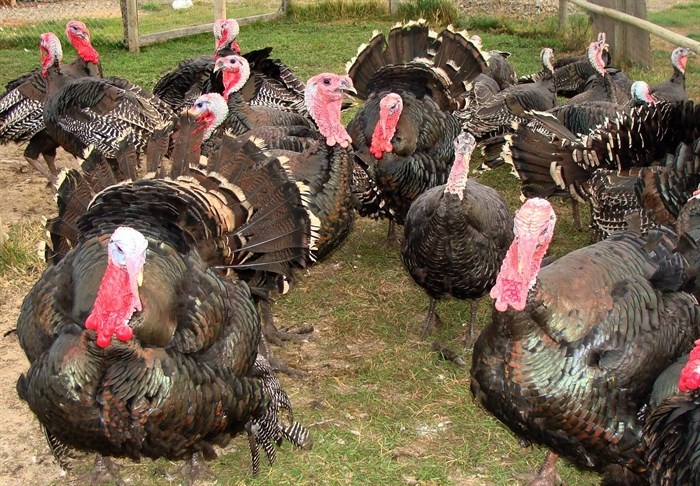
Turkeys at Sullindeo Farm
Image Credit: Sullindeo Farm via Facebook
May 28, 2022 - 3:29 PM
Half of the outbreaks reported in B.C. of the deadly avian influenza are in Okanagan flocks.
Last weekend, an outbreak of the highly contagious avian influenza was reported in a small flock near Osprey Lake, near Princeton.
Roughly 100,000 birds have been impacted in B.C. across 12 properties since the first avian influenza outbreak was reported at a North Okanagan flock, April 13. Half of the outbreaks are in the Okanagan, according to Canadian Food Inspection Agency data.
READ MORE: Farms in B.C. and Alberta latest to have confirmed outbreaks of avian influenza
“Biosecurity is a key tool for preventing the transmission of this disease to farm birds, small flocks and pet birds,” according to an email from the agency.
There are seven primary control zones that have been established by the Canadian Food Inspection Agency in B.C. The zones establish protected areas around an infected farm to try and stop the spread of disease.
“What that means is anytime you move something on or off a farm, you need a permit to move those things, so that allows the CFIA to … detect avian influenza early before there are any clinical signs,” said Amanda Brittain, chief information officer with the B.C. Poultry’s emergency operations centre.
At this time, poultry farmers are required to follow red-level biosecurity protocols and a provincial mandate to keep commercial flocks indoors until June 13 to prevent exposure from migrating birds.
Only three of the infected farms are commercial operations in the Lower Mainland and there haven’t been any additional positive cases in the last week which is a positive thing, Brittain said.
Outbreaks have been confirmed in every province except Prince Edward Island. Only B.C., Alberta, Saskatchewan, Ontario and Quebec have recorded new cases in May.
Poultry owners are being advised to use strict infection control measures and to take precautions to keep their flocks separate, secure and unable to mix with wild birds, which are believed to be carrying the virus.
“As the birds move out of the area and they’ve gone onto their summer homes, that reduces the chance of farmers, someone with backyard chickens, getting avian influenza,” she said.
B.C. Poultry is hopeful this means the cases will die down, but they remain at the highest level of biosecurity in the province, she said.
Poultry farmers are concerned but taking every precaution they can to prevent their flocks, she said.
There are about three million egg-laying hens in B.C. Turkeys have been more impacted in B.C. as they’re more vulnerable to disease and the two commercial in the Fraser Valley are turkey farms, she said.
To contact a reporter for this story, email Carli Berry or call 250-864-7494 or email the editor. You can also submit photos, videos or news tips to the newsroom and be entered to win a monthly prize draw.
We welcome your comments and opinions on our stories but play nice. We won't censor or delete comments unless they contain off-topic statements or links, unnecessary vulgarity, false facts, spam or obviously fake profiles. If you have any concerns about what you see in comments, email the editor in the link above.
News from © iNFOnews, 2022